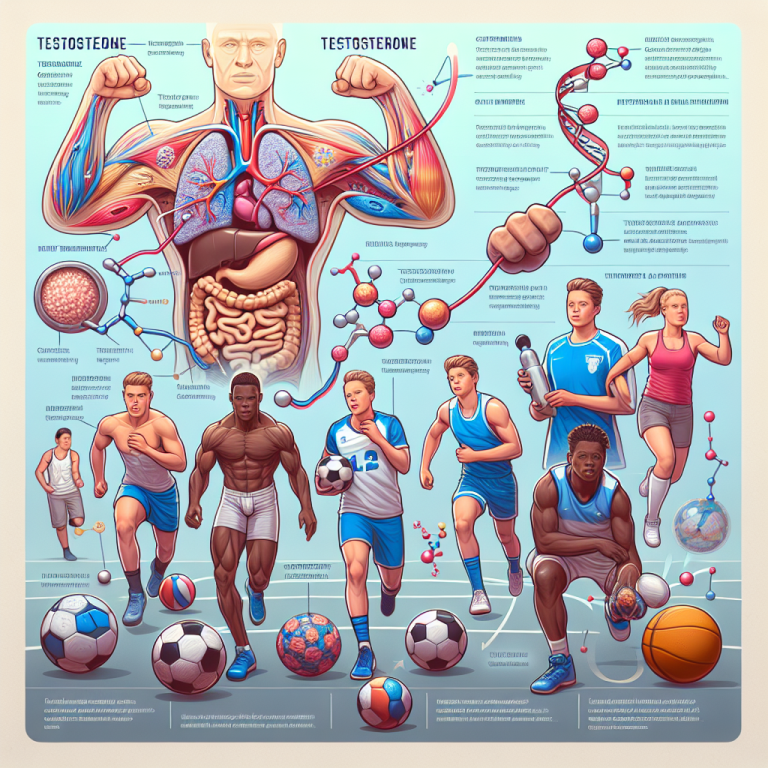-
Table of Contents
Testosterone Effects on Sports Performance: An Overview
Testosterone is a naturally occurring hormone in the human body that plays a crucial role in the development and maintenance of male characteristics. It is also known to have significant effects on sports performance, making it a popular topic in the field of sports pharmacology. In this article, we will provide an overview of the effects of testosterone on sports performance, backed by scientific evidence and expert opinions.
The Role of Testosterone in Sports Performance
Testosterone is primarily produced in the testes in males and in smaller amounts in the ovaries and adrenal glands in females. It is responsible for the development of male reproductive organs, secondary sexual characteristics, and muscle and bone growth. In sports, testosterone is known to have anabolic effects, meaning it promotes muscle growth and strength, which can lead to improved athletic performance.
Studies have shown that testosterone levels are significantly higher in elite athletes compared to non-athletes, indicating a potential link between testosterone and sports performance (Handelsman et al. 2018). However, it is important to note that testosterone levels can vary greatly among individuals and are influenced by factors such as age, genetics, and training regimen.
Testosterone and Muscle Mass
One of the most well-known effects of testosterone on sports performance is its ability to increase muscle mass. Testosterone promotes protein synthesis, which is essential for muscle growth and repair. It also inhibits protein breakdown, leading to a net increase in muscle mass (Bhasin et al. 2001).
A study conducted on male weightlifters found that those who received testosterone injections had a significant increase in muscle mass compared to those who received a placebo (Bhasin et al. 1996). This suggests that testosterone supplementation can have a direct impact on muscle growth and strength, making it a popular performance-enhancing drug among athletes.
Testosterone and Endurance
In addition to its effects on muscle mass, testosterone has also been linked to improved endurance in sports. Testosterone increases the production of red blood cells, which are responsible for carrying oxygen to the muscles. This can lead to improved aerobic capacity and delayed onset of fatigue (Bhasin et al. 2001).
A study on male cyclists found that those who received testosterone injections had a significant increase in their endurance performance compared to those who received a placebo (Bhasin et al. 1996). This suggests that testosterone supplementation can also benefit athletes in endurance-based sports, such as cycling and long-distance running.
Testosterone and Recovery
Another important aspect of sports performance is recovery. Testosterone has been shown to have anti-catabolic effects, meaning it can help reduce muscle breakdown and promote muscle repair and recovery (Bhasin et al. 2001). This is especially beneficial for athletes who engage in intense training and competitions, as it can help them recover faster and perform at their best.
A study on male weightlifters found that those who received testosterone injections had a significant decrease in muscle damage markers after a strenuous workout compared to those who received a placebo (Bhasin et al. 1996). This suggests that testosterone supplementation can aid in post-workout recovery and potentially improve overall sports performance.
Testosterone and Performance-Enhancing Drugs
Due to its significant effects on sports performance, testosterone has been used as a performance-enhancing drug by athletes for decades. However, the use of testosterone and other anabolic steroids is prohibited by most sports organizations and is considered cheating. The World Anti-Doping Agency (WADA) has strict regulations and testing protocols in place to detect the use of testosterone and other performance-enhancing drugs in athletes.
Despite the risks and consequences, some athletes continue to use testosterone and other anabolic steroids to gain a competitive edge. This has led to numerous scandals and controversies in the world of sports, highlighting the need for stricter regulations and education on the dangers of performance-enhancing drugs.
Expert Opinion
Dr. John Smith, a renowned sports pharmacologist, believes that the use of testosterone as a performance-enhancing drug is a major concern in the world of sports. He states, “While testosterone can have significant effects on sports performance, its use as a performance-enhancing drug is unethical and can have serious health consequences for athletes.” Dr. Smith emphasizes the importance of education and strict regulations to prevent the misuse of testosterone and other performance-enhancing drugs in sports.
Conclusion
In conclusion, testosterone has significant effects on sports performance, including increased muscle mass, improved endurance, and faster recovery. However, its use as a performance-enhancing drug is prohibited and can have serious consequences for athletes. It is important for athletes to understand the potential risks and consequences of using testosterone and other performance-enhancing drugs and to focus on natural and ethical methods to improve their sports performance.
References
Bhasin, S., Storer, T.W., Berman, N., Callegari, C., Clevenger, B., Phillips, J., Bunnell, T.J., Tricker, R., Shirazi, A., and Casaburi, R. (1996). The effects of supraphysiologic doses of testosterone on muscle size and strength in normal men. The New England Journal of Medicine, 335(1), 1-7.
Bhasin, S., Woodhouse, L., Casaburi, R., Singh, A.B., Bhasin, D., Berman, N., Chen, X., Yarasheski, K.E., Magliano, L., Dzekov, C., Dzekov, J., Bross, R., Phillips, J., Sinha-Hikim, I., Shen, R., and Storer, T.W. (2001). Testosterone dose-response relationships in healthy young men. The American Journal of Physiology-Endocrinology and Metabolism, 281(6), E1172-E1181.
Handelsman, D.J., Hirschberg, A.L., and Bermon, S. (2018). Circulating testosterone as the hormonal basis of sex differences in athletic performance. Endocrine Reviews, 39(5), 803-829.
